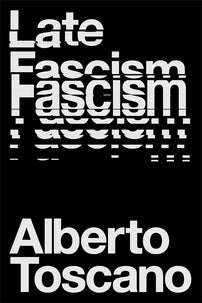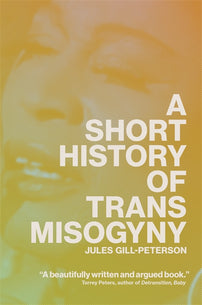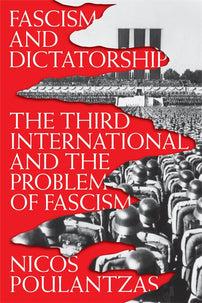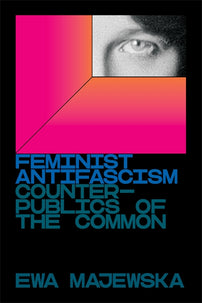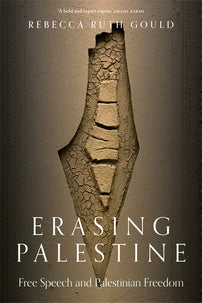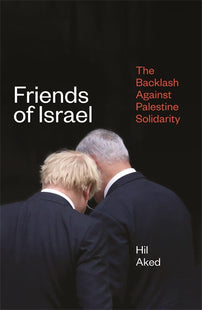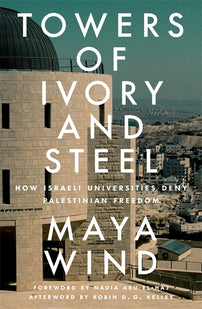Phony Physics
Thinking with Alberto Toscano's Late Fascism, Jordy Rosenberg asks: how has liberal analogical thought around Nazi fascism foreclosed in North America the history of the Nakba and of the ongoing genocide against the Palestinian people?

The below is a lightly edited version of a presentation given at a book launch for Late Fascism in February of 2024.
Mainstream liberal discourse in North America, at least since 2016, has been marked by a tendency to reach for analogies to make sense of the conjuncture. Alberto Toscano has described this as the reflex “to identify similarities between our present and the European catastrophe of the 1930s and 1940s” by way of a set of narrow “steps and checklists dictated by a selective reading of the Italian ventennio or the Third Reich.”[1] In the logic of the fascist analogy, we can only describe exercises of power and violence as fascist when they line up in total synchronicity with the Nazi exemplar. We have suspected all along that the analogical exemplarity of Nazi fascism allows liberalism to deliberately misrecognize fascism in all its forms – indeed, to shirk responsibility for and collaborate with these forms – and now these forms are the subject of Toscano’s tremendous book, Late Fascism, which conducts an exhaustive “metacommentary” on how we arrived at this situation by way of two main angles of approach. The first has to do with deepening our understanding of European mid-century fascism as only one iteration of a longue durėe of “racial fascism” in which the tools of Nazi genocide were themselves forged in a cauldron of Western colonialism that to this day continues to produce devastating iterations. So devastating are these iterations that it is both needless and yet necessary to say that the critical question for us now (not raised as such in Late Fascism but both formative of it, and emboldened and given theoretical support by it) is: how has liberal analogical thought around Nazi fascism foreclosed in North America the history of the Nakba and of the ongoing genocide against the Palestinian people?[2]
The false foreclosures of analogy operate as if analogy were an actual historical law, or a law of physics. Taking a page from Toscano’s interest in “phoniness” as a political modality of late fascism, we could say that, in the phony physics of analogical logic, fascism is only ever the fascism of the Third Reich, and genocide was only ever perpetrated once. The fascist analogy, in other words, is the epistemological foreclosure of thinking racial fascism as a structural and widespread logic of domination. Staging a conversation between Frankfurt School thought about the Nazi holocaust and theorists such as Angela Davis, George Jackson, and W.E.B. Du Bois, Toscano elaborates racial fascism along the lines of Du Bois’s “‘counter-revolution of property’” – the violent, racist, anti-democratic reaction to emancipatory struggle that, as Manu Karuka has it, has functioned as the “historical antecedent of imperialism”[3] and settler colonial statecraft going forward. As a work of critical theory, neither the details of this statecraft itself, nor specific political prescriptions, are Late Fascism’s concern; but the question of fascism in this book is never without its, so to speak, soundtrack, which we will hear, if we are listening. The question, that is to say, of what is to be done.
What is to be done about the fact that the false foreclosures of the fascist analogy don’t just exist in language, but are made possible through institutions? Institutions that attempt to normalize what the historian Rana Barakat has described as the systematic and longstanding delegitimization of Palestinian knowledge and knowledge-production by the Israeli state project through, among other things, subjecting “even indirect suggestions of the word ‘massacre’ (like the word ‘Nakba’) … to censorship.”[4] Institutions that compose what the scholar and lawyer Nadera Shalhoub-Kevorkian has described as a settler-colonial “physics of power” that provides “protection … to the ideologies and strategies of domination and control.” [5] Institutions that systematically cleanse the records of their own history of ethnic cleansing. [6] It must be said very clearly, moreover, that what goes on in language – these analogical foreclosures – are woven into the broad genocidal destruction of the means to reproduce life, as what Karma Nabulsi has termed “scholasticide.” So although Late Fascism is not a political handbook, there are conclusions to be drawn from it about the authorizing conditions under which analogy presents itself as the only way to conduct an inquiry into “‘fascism within the totality of its ‘process.’”[7] And because Palestinian civil society organizations have given us the gift of solidarity in the form of the BDS movement, there are also conclusions to be drawn from this book about some necessary political responses to those conditions.
The second angle taken by Late Fascism is to shift the framework for thinking fascism away from the psychodynamics of individual fascists to an understanding of structures of the racial state.[8] Toscano is remarkably immune to getting caught up in the particulars of fascist psychology; he is more interested in the question of a fascist “area” – the fascism of control societies, which, as per late Adorno’s critique of early Adorno, “‘carr[y] out the expropriation of the unconscious by social control, rather than mak[e] subjects conscious of their unconscious.”[9] The crucial shift from diagnosing fascist mentalities to describing a fascist area allows Toscano to focus on the mediations that authorize and organize this area, rather than referring the question of fascism to individual explanations, personal histories, madness, cathexis, perversion, etc. Toscano’s concern here is to expose and discredit the “simulacra of class struggle” – the “subject-supposed-to-have-voted [for Trump]” – that fetish that lets the ruling classes off the hook for rashes of “fascist-populis[m],” and permits the “tawdry self-satisfied condescension” of liberalism. For Toscano, this “politically … spectral notion of the working class” is supplemented by “whiteness … not just at the level of discourse, but. . .at the level of political experience,” imbuing this “pseudo-collective agency” “with a (toxic) psychosocial content.”[10] Genuine resistance against this toxic content has nothing to do with liberal elitist shuddering, but must take the form of robust, anti-racist class politics which, Toscano argues, far from being the “carrier of the fascist virus” is “its antibody.”[11]
[book-strip index="1"]
Interestingly, Toscano does in fact manage to open questions about the libidinal character of fascism, but without relying on a symptomatology of fascist personality. Taking up Foucault’s opposition to the idea that fascism is only fascism if it involves the centralization of power under an authoritarian state, Toscano explains that, for “Foucault, to the extent that there is an eroticization of power under Nazism, it is conditioned by a logic of delegation, deputizing and decentralization of what remains in form and content a vertical, exclusionary and murderous kind of power.” Fascism, then, argues Toscano, “is not just the apotheosis of the leader … it is also … the reinvention of the settler logic of petty sovereignty, a highly conditional but very real ‘liberalizing’ and ‘privatizing’ of the monopoly of violence.”[12]
Prominent among the array of strongholds for the deputization, eroticization and privatization of violence, is, of course, the settler family. For the fascist area is marked by a brood-mania, or what Toscano, citing Maiocchi in 1979, lays out with a startling resonance for today: “‘The ‘emotional’ plague of fascism is spread through an epidemic of ‘familialism.’”[13] In a bravura conclusion to the book, Toscano brings the mid-century European, later 20th century Italian, and contemporary North American contexts into conversation, not to analogize them, but to sort out the complex texture of breaks and continuities therein. Via Tim Mason’s work on Nazism, Toscano addresses what we could call racial fascism’s “familial fix”, which Mason describes thusly: “‘The nightmare world of dictatorial government, huge industrial combines, all-encompassing administration and organized inhumanity was parasitic upon its ideological antithesis, the minute community of parents and children.”[14] As to our situation today, Toscano builds on but departs from Mason’s view, finding in contemporary far-right culture a similar hysteria for familialism – “in which the repair and reinvention of a martial masculinity and the anxious nostalgia for the heteronormative family as the cell-form of the demos and ethnos are the foci around which an entire institutional and ideological infrastructure is cohering” – but with an explicit obsession on “‘gender ideology’ and transness as nemeses.”[15]
Unlike the inability or refusal of some leftist thinkers to develop a textured analysis of what these anti-trans impetuses are doing, (beyond the frequently reiterated weak non-thesis that sees attacks on trans people as simply base-frothing for elections), Late Fascism has taken the time to seek a more structural account. Some of this time-taking involves a deep dive into Frankfurt School-era debates over fascism and antisemitism, reinterrogating and testing for political soundness some inherited truisms, even those found in Adorno and Sohn-Rethel who, for Toscano, to some extent condense antisemitism into a linear reflex against the abstractions of the commodity-form, thus casting Jews as commodification’s metonymic substitute. Preferring Norbert Guterman and Lefebvre’s 1964 invective, in Mystified Consciousness, against the reductions of bourgeois Reason, Toscano urges us toward a praxis-oriented understanding of the complex “geolog[ies] of (false) consciousness that exer[t] a shaping pressure”[16] on lived, embodied resistance to fascism. In place of linear diagnoses that don’t relate organically to coherent, strongly-rooted resistance movements; we need “a science of ideology capable of confronting fascism’s ideological work – its marshaling of libidinal and utopian energies from multiple pasts and jagged temporalities.” If fascism, as Toscano argues, “is the reactionary use of sediments in a social atmosphere of capitalist crisis conditioned by real abstraction and its shearing contradictions,”[17] it is our work – and Toscano’s – to understand what those sediments and real abstractions are, and how they are arranged and experienced, in any given conjuncture.
[book-strip index="2"]
Always Toscano is thinking about mediation, and anti-trans ideology, for him, cannot be reduced to something like political theater. Rather, it holds the place of what he sees as a kind of transcendent stitch, “stand[ing] … for the planetary process … that the [fascist international] must work together to repel.”[18] Making this claim relies on being able to think fascism beyond the Nazi analogy, because unlike the mid-century European context, epidemics of fascist familialism in North America today can’t only or primarily be understood as a response to the alienations of an administrative authoritarian state. Rather, for Toscano, they may be understood as an effort to bind an otherwise incoherent fascist international, one that neither has its own transcendent horizon, nor a singular ideological goal. Indeed, the landscape of contemporary North American racial fascism is a heterogeneous jumble of heimatische fantasies of racial purification – the “desire for ethnonational rebirth … stoked by the imminence of a [transgender] threat projected as civilizational, demographic and existential” – combined with a phantasmagoria of idiosyncratic new “microfascisms.”[19] A cottage industry, we might say, of gig-fascists: “mail-order huckster[s],”[20] body hackers, and fanatical right wing internet family men entrepreneurializing a slew of back-to-the-land pornotropes. This pixelation of fascist masculinity into 24/7 lifestyle gig dramatizes a closure of the metabolic loop of settler man and land in a hellish cartoon that is exactly as preposterous and chaotic as it is deadly. Anti-trans animus offers a suture of its incoherent international groupuscules at the level of the body, the domestic, and the libidinal. “Fascism’s antipolitics of sex is a strategy,” says Toscano, taking a page, we might imagine, from anti-imperialist feminisms like those of Audre Lorde, or Nada Elia, or anti-imperial queer organizations such as al-Qaws, “for tying the geopolitical to the genital.”[21]
Contemporary petty sovereignties are, then, critically dependent on an anti-transness that composes to some extent the infrastructure, however shaky, of a right-wing internationalism. I would add here that the reason why fascism’s antipolitics of sex works as a mediation in this way has to do with a widespread left shift and resurgence of a radical class politics (one that connects at many junctures with the struggle for trans self-determination) that has accompanied the rightward shift Toscano is tracking. We see this in, for example, the amazing preponderance of trans organizing in the service worker strikes, or in Angela Davis seizing on the transitional kernel of transness during the George Floyd uprisings of 2020 – her suggestion that the abolitionist demand has as its necessary though not sufficient condition of possibility, the fact of transness, which contributes to abolition a shared horizon: "if it is possible to challenge the gender binary, then we can certainly effectively resist prisons, jails, and the police.” In other words, the extent to which the “epidemic of familialism” works as a transcendent stitch for the fascist international, has to do in part with the fact that the fascist anti-trans right attempts not only to abject transness from the social field, but in so doing to counter elements of an increasingly militant class politics, and to poach a horizon that is inherent in the lived materiality of transition – the simple but hard-won horizon, or thesis, as the poet and theorist Kay Gabriel puts it in a forthcoming essay, “that sex can change.”[22]
This poached utopian kernel notwithstanding, Toscano’s insight about the lack of a contemporary fascist psychological core is critical, especially given that, all the while, liberal discourse continues its hunt for aberrant fascist psychopathologies. But this hunt is a diversion that does not work on Toscano, for whom the category of “true believer” is quite a bit less salient than the proliferating landscape of fascist “post-psychological” fanaticisms. Such fanaticisms may be “phony,” but they are all the more dangerous for that. This insight into phoniness is vital to the breadth and applicability of Toscano’s project, in part because it allows us to confront phoniness as a serious social paroxysm, capable of driving what Jairus Banaji describes as a “‘[m]anipulated seriality … at the heart of fascist politics’ … because it is not just any mass that fascism conjures up, but an other-directed mass that never ‘fuses’ into a group, a mass which must produce macro-effects at the bidding of the group ‘other-directing’ it, all the while remaining dispersed.” Of course belief, as Toscano illuminates by way of Adorno, is not required in the unleashing of torrents of genocidal violence: “‘[Phony fanatics] … perform their own enthusiasm, and … through this performance. . .they strike a balance between their continuously mobilized instinctual urges and the historical stage of enlightenment they have reached, and which cannot be revoked arbitrarily.” It is this refuge in the pernicious facade of “innocent,” bourgeois Reason that is at play in Western states’ enabling of and direct material participation in the genocide on Palestine. It is at play in the hollow liberal denunciations of singular Israeli cabinet members, such as Belazel Smotrich and his infamously putrid and grandiloquent blather (“I am a fascist homophobe”), and in the equally hollow talk of sanctions on singular Israeli battalions or settlers, as if only true believers could be responsible for the sadistic massacre of Palestinians, when we know that liberals and putative non-homophobes (whatever that might mean in a situation of indiscriminate murder) are perfectly capable of conducting genocide, and have done, and are doing so.[23] The particular species of bad faith with which we are every day deluged, whereby “enlightened” liberal democracies manage to both perpetrate and distance themselves from responsibility for mass murder and forced famine, is the old, awful key in which settler genocides have long been played, and by which the Western establishment, with its ridiculous, “reasonable” prattle, fully endorses the monstrous marriage of petty sovereignties to genocidal statecraft.
[book-strip index="3"]
To return, in closing, to Toscano’s “antibody” to these plagues of petty sovereignty and genocidal statecraft: class politics. Here we have to note that this antibody is one that, in North America, has received a remarkable intensification as the result of the Palestinian struggle against genocide, which has put the question of anti-imperialism solidly back on the table for North American labor movements. Many organizations have responded with force, among them UAW International, Starbucks Workers United, Amazon and Google Workers No Tech for Apartheid, and multiple teachers associations in Massachusetts, Minnesota and elsewhere. Moreover, the effect of solidarity in the realm of cultural work is significant, with literally hundreds of North American and European arts and cultural organizations now committed to the Palestinian Campaign for the Academic and Cultural Boycott of Israel (PACBI), and the birth of organizations like Writers Against the War on Gaza, touched off initially, in part, with a walkout of journalists in protest against the NYT’s shameful and ongoing Israel-boosting coverage.[24]
The dynamic by which we here have been massively advanced and awakened in our political thinking and capabilities through the work of solidarity, should remind us that when we encounter resistance to joining the movement for Palestinian liberation in our workplaces, organizations and unions – and when such resistance takes the form of a claim that standing with Palestine weakens our leverage as workers – this is a misrecognition of the fact that whatever strength we have built is due in part to a longer history of rank and file organizing by radical caucuses, many of them led by bipoc workers with anti-imperialist concerns over many years – as, for example, Zeina Alsous, Alex Press, and Jeff Schurke have recently argued regarding the history of Arab workers’ caucuses in the UAW. The objection that our unions would be compromised by taking a stand in solidarity with Palestine thus elides both the real interconnectedness of struggle, and the historical processes by which our unions get and have gotten strong in the first place.[25] The question of Palestine is a question of whether we have a right to care about the world, and, indeed, a right to act in horrified, unwavering protest against the “unmitigated evil” that is being inflicted upon the people of Palestine.
Over ten years ago, in a speech given at an American Studies Association meeting, Fred Moten expressed his gratitude to the Palestinian people for their call for BDS. Participating in this movement refreshes our “extra-political sociality,” Moten said. By inviting us to act “in solidarity … with that richness, impossibly developed in dispossession and deprivation, that comprises the social and theoretical resources of Palestinian life,” we are invited into an international orientation otherwise vacuumed out of American politics by McCarthyism and McCarthyite repression tactics, not to mention, we might add, decades of crushing wage blight and austerity. This might be another way of getting at what Alsous, Schurke and Press raise around the ways that Palestine solidarity opens a question about whether we, as workers, have the right to be connected with the world and to fight for it. The unprecedented groundswell of support for PACBI reflects, too, the ways in which the call for BDS has been the gift of an education in collective action, one communicated through the depth and sophistication of Palestinian thought on culture and the arts – itself honed, in part, over 76 years of fighting for the “right to education” (a right not unrelated to that for which we now find ourselves, too, participating in a struggle with many thousands of brilliant, steadfast, clear-eyed students). This training in Palestinian “social and theoretical resources,” will undoubtedly have effects far beyond the present moment, and important ones in the face of the plagues of petty sovereignty that Late Fascism details. For so long, we have been trailing the Palestinians in Palestine in clarity and courage,[26] and so I’ll close by saying that we have their many decades-long struggle to strive to be equal to, in what courage and determination we have managed to gain in ours.
[1] Alberto Toscano, Late Fascism, Verso, 2023, p. x.
[2] As the anthropologist and legal scholar Darryl Li recently put it, speaking about South Africa’s Application to the ICJ on the Convention on the Prevention and Punishment of the Crime of Genocide in the Gaza Strip: “The idea of [the Nazi] genocide as the crime of all crimes ... has played an ... important part in the ideological ... underpinnings for the state of Israel in justifying the dispossession of Palestinians ... The gatekeeping of genocide is ... in many ways about a broader political debate that says [that] ... anyone ... that wants to make genocide accusations that don’t accord with our agendas ... Are not only wrong but ... have to be ... delegitimized.”
[3] Manu Karuka, “The Counter-Revolution of Property Along the 32nd Parallel,” in Destin Jenkins and Justin Leroy, eds., Histories of Racial Capitalism, Columbia University Press, 2021, p. 160.
[4] Rana Barakat, “How to Read a Massacre in Palestine, AlMuntaqa, September/October 2022, Vol. 5, no. 2.
[5] Nadera Shalhoub-Kevorkian, “Palestinian Feminist Critique and the Physics of Power: Feminists Between Thought and Practice,” feminists@law , Vol 4. no1.
[6] As the anthropologist Maya Wind charts, “3 percent of the files in Israel’s governmental archives, and under half a percent of files in the Israeli Defense Forces and Defense Establishment Archive, are currently available to the public. Maya Wind, Towers of Ivory and Steel, Verso, 2024, p. 121.
[7] Toscano, citing Kojin Karatani’s “History and Repetition in Japan,” p. x.
[8] In the process, Late Fascism highlights the tight bonds between fascism and neoliberalism. This is not a topic I have the space to explore here.
[9]Toscano, p. 16 on Adorno’s critique of his own work on the psychological causes of fascism in The Authoritarian Personality.
[10] Ibid., p. 20.
[11] Ibid., p. 21.
[12] Ibid., p. 141.
[13] Ibid., p. 144.
[14] Ibid., p. 148.
[15] Ibid., p. 152.
[16] Ibid., p. 90.
[17] Ibid.
[18] Ibid., p. 152.
[19] Jack Z. Bratisch, On Microfascism: Gender, War and Death, Common Notions, 2022.
[20] Toscano, p. 142.
[21] Ibid., p. 20. See Audre Lorde, Sister Outsider, Crossing Press, 2007, Nada Elia, Greater Than the Sum of Our Parts: Feminism, Inter/Nationalism, and Palestine, Pluto, 2021, Eman Alasah, “The Palestinian Feminist Movement and the Settler Colonial Ordeal: An Intersectional and Interdependent Framework,” Meridians, 2024, 23 (1).
[22] That sex can change, Gabriel argues, comprises the minimal demand of and is borne out materially by trans people, but is a horizon that has become increasingly stitched to demands made broadly by other movements on the left in the U.S., particularly – as Gabriel and Doyle Griffiths have argued separately – in unions, especially teachers unions. More recently, Gabriel has made an explicit argument about the ways in which anti-trans legislation is specifically an effort to crush teacher’s unions. See also Doyle Griffiths.
[23] See also: Jasbir Puar, Terrorist Assemblages: Homonationalism in Queer Times, Duke UP, 2007.
[24] One member of WAWOG said explicitly on Democracy Now that they signed the letter: “as a person who doesn’t support an ethnostate and a genocide. . .the other part has to do with what do we expect of contingent labor. I don’t have benefits, I don’t have any kind of protections, so that’s how most of the journalism in our industry is currently being produced in this moment, by contingent laborers, and I think there’s this bigger question ... if the New York Times provides nothing to you, what do you owe them in terms of your speech ... [I]n some way it was a small amount of protest over the labor conditions in the industry at large.”
[25] Needless to say, the objection also tendentiously refuses to recognize the ways in which the repressive militarization of campuses and the rampant changing of regulations by fiat on the part of administrators to prevent and prohibit events like lectures, grieving circles, and conversations in support of Palestine and against genocide, are among other things, flagrant workplace violations and workload burdens. But that is a topic for another time..
[26] About queer politics, for example, Palestinian organizations in Palestine – for example, al-Qaws – have long led the way in an incisive critique of pinkwashing, and an analysis of the relationship between settler colonialism and queer politics.
After October 7th, moreover, Queers in Palestine rearticulated this relationship with clarity, dispensing easily with liberal apologetics for imperial war: “Israeli society continues to weaponize queerness for the purposes of justifying war and colonial repression.”
